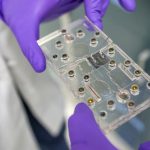
Researchers at the University of Central Florida continue to push forward the field of human-on-a-chip technology, showing in a new study that their system could one day replace animal testing, particularly in the cosmetic industry.
Background
Led by Dr. James Hickman, a professor at UCF NanoScience Technology Center, the UCF team has been working on developing a system that can mimic human organs and provide a platform to test drugs and various chemicals outside the human body.
The UCF team is one of several groups around the nation to work on developing what’s called “human-on-a-chip” or “body-on-a-chip” technology. The chips contain human cells suspended in a medium, so potentially one day researchers can see how a drug would act in the human body based on what happens in these small chips.
The systems have the potential to help study drug interactions, impact long-term drug use and advance the field of personalized medicine.
Most human-on-a-chip technologies use one type of human cells, representing one organ. UCF researchers say that their chip technology is a first to use four organs, which can be non-invasively monitored long-term and in real time. These properties give the chip the potential to replace animal studies, researchers say. Their study is published in the journal Advanced Functional Materials.
Why it’s important
Currently, scientists can test the efficacy of drugs outside the body (in vitro), and for longer-term studies, they use animal models. The human-on-a-chip systems can improve the current in vitro models and replace some of the animal testing, researchers say.
The UCF team said their system could particularly be useful for the cosmetic industry, which is banned from animal testing in the European Union.
UCF startup’s product could bypass drug tests on animals
How it works
The UCF team’s chip has several compartments with human cells. Each compartment mimics an organ — heart, liver, skeletal muscles and the nervous system — and can interact with the other compartment via a medium.
In their latest paper, UCF scientists reported that they were able to run a 28-days test on the chip, which is the minimum time frame for animal studies to evaluate the toxicity of a drug, successfully monitoring electrical and mechanical functions of the cells in real time.
“The technology could allow, in the near future, the movement of chronic drug experiments done currently in animal in vivo models to these novel human in vitro models,” UCF researchers wrote in their study, which was funded by L’Oreal Corporation and the National Institutes of Health.
Hickman is also the founder and chief scientific officer of the human-on-a-chip company Hesperos. The company recently received a $4 million grant from the National Institutes of Health to increase its platforms’ capabilities and prepare its systems for regulatory approval.
Original story by Naseem S. Miller can be found on the Orlando Sentinel